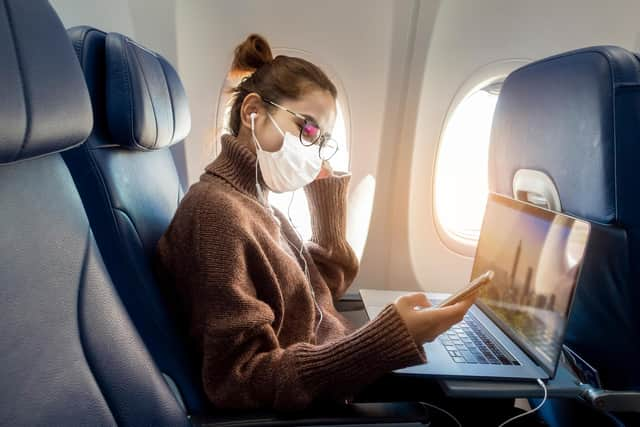Who is exempt from Covid testing for travel? Full list of people who don’t need a fit to fly test in Scotland
Travel from the UK has been largely restricted since the pandemic began last March and illegal for non-essential reasons since the beginning of 2021.
However, the continued rise in coronavirus cases has led to tighter restrictions on travel for residents of the UK and tourists wishing to visit.
Advertisement
Hide AdAdvertisement
Hide AdOn 15 January, it will become mandatory for travellers into the UK to have a negative coronavirus test no more than 72 hours before arriving at the UK borders.


There are only a limited exceptions to this rule - these are the exempt groups.
What is the new rule on covid testing pre-arrival?
From 15 January, all international arrivals to Scotland - even if the UK is your permanent place of residence - will be required to present a negative COVID-19 test taken up to 72 hours prior to departure.
The UK Government website states: “The standards that tests must meet ... include that the test must be of a diagnostic-standard test such as a polymerase chain reaction (PCR) test, and could in some cases include LAMP and lateral flow tests within set limits.”
The rules apply to anyone arriving into the UK by vehicle, train, plane or boat.
This is in addition to the need to fill out a Passenger Locator form and to self isolate for 10 days, if you have arrived from a country outside the current travel corridor.
Anyone who does not comply with the new testing regime could face an immediate fine of £500.
Michael Mattheson, the Scottish Transport Secretary, announced the restrictions on Friday, 8 January. He also stated that “Travel into or out of Scotland is currently illegal and that will remain the case while we work to suppress the new strain of COVID-19.”
Advertisement
Hide AdAdvertisement
Hide AdTherefore it is only under exceptional circumstances, such as to maintain essential supply chains, critical national infrastructure or to contribute to crisis response or other essential government work, that you can travel abroad or into the UK.”
Do I still need to self-isolate if I have a negative test?
Having a negative test does not mean you do not have to isolate.
The only people who are exempt from isolating for 10 days on arrival in the UK are those arriving from a country with a travel corridor with the UK.
Everyone entering the UK must have completed a passenger locator form, regardless of whether you have a negative test or arrive from an international country with a UK travel corridor.
Who is exempt from the need for a negative Covid test?
A small number of people are exempt from the testing regime and will not be fined for non compliance.
These groups are:
- Arrivals from common travel area arrivals - This is not the same as a travel corridor country. Common travel areas are anywhere in the United Kingdom, Ireland, Isle of Man, Jersey and Guernsey.
- Children under 11 years old
- Hauliers and International travel employees - to allow the free flow of freight, and air, international rail and maritime crew.
What if there is a lack of testing infrastructure in my departing country?
Advertisement
Hide AdAdvertisement
Hide AdA lack of sufficient testing in your departing country will not be an eligible excuse for presenting at the UK border without a test, except from if you are arriving from St Helena, Ascension Island and the Falklands.
A time-limited exemption is also in place for three further international areas, after which time you will be expected to have an adequate test.
These countries are:
Antigua and Barbuda – until 4am Thursday 21 January 2021
St Lucia – until 4am Thursday 21 January 2021
Barbados – until 4am Thursday 21 January 2021
The Scottish and UK Government are set to outline further details in the coming days.
This article will be updated as and when these details are set out by the respective Transport Ministers.